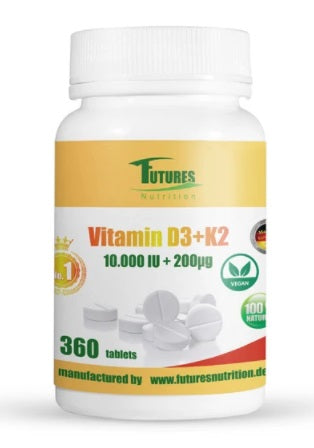
Vitamin D3 against depression
Share
Vitamin D3 against depression

Help Vitamin D3 For depression? Vitamin D3 is also known as cholecalciferol. It is included in animal foods such as salmon, egg yolk and cod. Vitamin D3 is necessary for general health. It is taken over the sun, on food that is eating daily, or on dietary supplements. Vitamin D3 is an important nutrient that maintains the health of bones, teeth, muscles and immune system.
Vitamin D3 is commonly referred to as "sunshine vitamin". This is because the skin creates vitamin D3 when exposed to sunlight.
The sunlight, however, is an excellent natural source of vitamin D3. The UV rays of the sunlight convert the cholesterol into their skin in vitamin D3. A sufficient intake of vitamin D3 is essential for good health. It contributes to the conservation of strong and healthy bones, supports the immune system and can help protect many harmful diseases. It plays a really extraordinary role in the body for comprehensive health and well-being.
Vitamin D3 and depression
There is a close connection between depression and vitamin D3. The researchers found that people who suffer from depression have a low vitamin D3 mirror in their blood.
Another study proves that a vitamin D deficiency causes a postpartum depression during pregnancy.
In addition, some other research found that people who suffered other chronic diseases such as strokes or spinal cord injuries due to a vitamin D deficiency also suffer from depression.
Does vitamin D3 help with depression?

Low concentrations of vitamin D3 In your body are associated with depression. The intake of vitamin D3 for the treatment of depression can help to cheer up if the vitamin D3 quantity is low in your body. Several studies have shown that vitamin D3 can help eliminate depression.
Another high quality Investigation of 18,000 depressive people revealed that taking 2000 IE per day helps reduce the stress levels. However, if you suffer from depression, you should definitely see a qualified doctor and take sufficient vitamin D3.
An April 2014 in the journal psychosomatic Medicine published overview work showed that people who have severe depression during severe depression Take vitamin D3, After taking Vitamin D3, feel an improvement or are less depressed.
According to a small study, taking suitable vitamin D is no confirmation that you do not get depression, but it can significantly reduce the risk of depressive signs. The universal distribution of vitamin D3 receptors in the brain could play an important role in the impact of vitamin D3 on the mood.
How much vitamin D3 should I take in depression?
In order to avoid a vitamin D deficiency and reduce the risk of depression, you should take the recommended daily dose of 15 micrograms Vitamin D for adolescents and adults or 20 micrograms Vitamin D for people over 70 years. A 10 to 15 minutes stay in the sun in three days a week, which is often more difficult in winter, generally sufficient to cover the vitamin D3 needs of the body. The consumption of vitamin-D3-rich foods such as fish oil, milk, egg yolk, yogurt and vitamin D3 enriched orange juice helps to increase the vitamin D3 mirror.
So take a dose of vitamin D supplements, as recommended by your doctor. If you improve your vitamin D intake in depression, you should not first see a qualified doctor to treat yourself, but it can help raise your mood.
Symptoms of vitamin D deficiency and depression

Vitamin D deficiency and depression are two different diseases. Therefore, the symptoms of both diseases also differ from each other.
Symptoms of a vitamin D deficiency
- Bone pain
- fatigue
- Muscle tension
Symptoms of depression
- insomnia
- Appetite
- anxiety
- Loss of interest
- Memory problems
- Constant headache
Precautions

You should not take Cholecalciferol if you had an allergic problem with vitamin D or if you have the following
- High amounts of vitamin D in your body (hypervitaminosis D);
- high calcium sums in the blood (hypercalcaemia);
- Any situation that makes it more difficult to absorb nutrients from the food (malabsorption).
The extra amount of vitamin D could damage an unborn or lusty child. Talk to your doctor before taking vitamin D3 when you are pregnant or breastfeeding. Your dose requirement can be different during pregnancy or breastfeeding. Do not give Cholecalciferol to a child without a medical advice. The dose for your child depends on age, weight, nutrition and many other factors.
conclusion
Vitamin D3 is an essential nutrient for physical and mental health. As we know, various studies have shown that a low vitamin D3 mirror is one of the main causes of depression. Therefore, a sufficient amount of vitamin D3 helps to reduce the symptoms of depression.
If you suffer from depression due to a vitamin D deficiency, you should take vitamin D3 preparations. the Vitamin D3 preparations are easily available on the market and you can easily buy. But note a thing that if you are pregnant or have another medical problem, contact your doctor first before taking a dose of vitamin D3.
